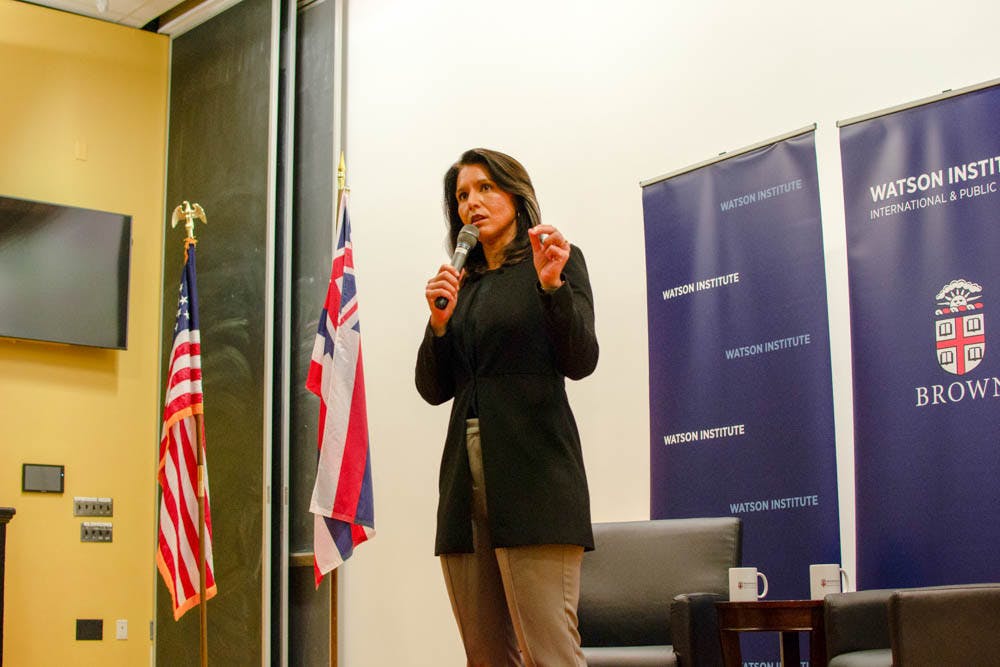Monday evening, Rep. Tulsi Gabbard, D-HI, named the cost of war as the focus of her bid for the White House in 2020.
Gabbard told the audience at an event hosted by the Watson Institute for International and Public Affairs that as president, she would work to end American regime-change wars and what she called “the New Cold War,” referencing tensions with nuclear powers like North Korea. She would redirect funds from the military to domestic infrastructure projects.
“We need to decide whether we want to continue as a country to be the world’s police — intervening in one foreign country after another, toppling one dictator after another — or focus on taking care of our people and rebuilding our own communities,” Gabbard said. “We cannot afford to do both.”
Though election season is far-off and the field of candidates is increasingly crowded, Gabbard seems hopeful, telling The Herald that she possesses a unique set of experiences “that nobody else has.” Gabbard has served in the Army National Guard for 16 years, deployed twice to the Middle East and served on the Armed Services and Foreign Affairs Committees in Congress for six years. In 2002, Gabbard was elected to the Hawaii House of Representatives at 21 years old, becoming the youngest woman ever elected to a U.S. state legislature.
Gabbard’s platform is especially motivated by a false alarm in January 2018, when her constituents in Hawaii received a broadcast on their local TV, radio and cell phones warning: “BALLISTIC MISSILE THREAT INBOUND TO HAWAII. SEEK IMMEDIATE SHELTER. THIS IS NOT A DRILL.” The governor of Hawaii, David Ige, later told CNN, “An employee pushed the wrong button.”
Gabbard believes the U.S. government might avoid global nuclear conflict by refraining from overthrowing foreign regimes. “As tensions continue to increase, as we find ourselves in the place that we are, the prospect of nuclear war is not a question of if it will happen — it’s a question of when, if we continue down this path,” Gabbard said. “It doesn’t have to be this way. … That’s why I’m running for president.”
In a brief onstage interview, Senior Fellow in International and Public Affairs Stephen Kinzer asked the congresswoman about the state of her campaign. He addressed Gabbard’s unconventional approach to foreign policy and her scarce presence in the media compared to other presidential candidates. “Do you think there’s a connection between those two facts?” Kinzer asked, to the audience’s laughter and applause.
“Unfortunately, yes,” Gabbard replied. “It is not only those in the foreign policy establishment, it is not only those in the military-industrial complex, but it is also many in the media who continue to perpetuate these same failed policies and who seek to squash the voices of those of us who are challenging … the status quo with the truth.”
In a question-and-answer session, Ella Kilpatrick Kotner ’19, an organizer of the Sunrise Movement and one of Gabbard’s constituents, brought up the issue of climate change and the Green New Deal, which Gabbard has not endorsed.
“Now that there is a resolution on the table, you’ve refused to support it,” Kotner said. While Kotner acknowledged Gabbard’s “Off Fossil Fuels for a Better Future Act,” which would transition electricity and most transportation systems in the United States to 100 percent renewable energy by 2035, she said, “We need you to cosponsor the Green New Deal.”
In response, Gabbard said a major concern of hers was that “nuclear power is not mentioned in the resolution as an option that we will not consider.”
Other members of the audience were unsure of the practicality of Gabbard’s proposals.
“I’m a little skeptical how she’s actually going to get the reallocation of armed military budget to social services done,” said Lucas Fried ’21.
Gabbard’s visit, organized with help from Vivek Pandit ’20 and Kinzer, was part of the Taubman Center for American Politics and Policy Watson Distinguished Speaker Series.





